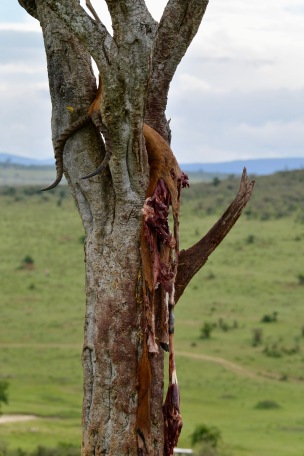I’ve been having a great time in Kenya and spending quite a bit of time checking out the locals, both animals and people.
I’ve had the pleasure of visiting with some members of the Samburu tribe in central Kenya. What I’ve learned has continued to enlighten me on the social and economic problems many Kenyan’s are facing. Here’s a snapshot.
The Samburu are one of the local tribes still holding onto some of their traditional beliefs and patterns. They do not hunt (as no Kenyan is allowed to) or gather for food. Their diet consists of corn, goat milk and blood (which they cook several different ways). They don’t often slaughter their animals and have very few livestock consisting of goats, sheep and a few cows. They cannot produce enough food to feed their rapidly growing population, so they are primarily reliant on economic aid in the form of maize (corn).
They circumcise both men and women – yes, they still circumcise women so they are “less inclined” to fool around with another man. Each male will take as many as 5 wives and each will bear 5 children on average. I couldn’t get an answer on what happens to a woman if she is fertile, but my understanding is she is cast out of the tribe, never to be seen again. Basically, left in the bush for carnivore food from what a local tells me. When asked about their polygamy belief and population growth; their belief is the more children they produce, the better chance the children will bring the parents wealth, in the form of livestock. Although they desire wealth in the form of livestock, all funds are pooled with the tribe for purchase of supplies by one of the elders.
Some of the Samburu are starting to attend school, but even the local schooling may be cost prohibitive as they don’t have any real source of income. The strongest and smartest kids do not attend school, as these kids are needed to tend the livestock. The less desirable kids are sent off to school. A few of the local tribes are now starting to get on board with tourism, by the means of allowing tourists into their camp to take photos and ask questions. This is what the Massai has been doing for the past 10 years or so, and have become a fair bit more successful by selling some handmade crafts. Unfortunately, the Samburu are a fair bit behind with the quality and extent of any product.
As many already know and as I’m just learning, with rapid population growth, no schooling, no source of economic income, the problems the tribal populations are facing are growing quicker than the economic aid can sustain. Obviously this why education is so important to everyone living in developing countries.
Here’s a different life story of a Kenyan.
A young man from the Meru tribe attends school from a very young age. He learns to hunt and gather from the time he was able to walk (and when the Kenyan could still hunt). He continues his education through high school, then starts a career as a “driver” for locals and tourists needing a lift. Shares his knowledge of the outdoors with his passengers and turns this into a National Park “driving” job. A very humble term he uses to describe his job. He’s a guide.
After some years of guiding in Africa, starts his own “driving” business and builds a consistent and repeat clientele from around the world. He does such a stellar job with his business, ends up being mentioned in the New York Times as one of the star guides in Kenya, still referring to himself as a driver. Keep in mind, he is still an owner operator – no employees.
The man takes his profits from his guiding business and buys a second piece of property where he starts growing bananas, raising cattle (with primarily purposed for banana fertilizer), and goats. This is his retirement as he describes it. He has employees that watch over his property, tend his livestock and harvest his fruit for sale.
I had the pleasure of spending 4 days with John, his Christian name, touring several different parts of Kenya and doing my best to blend in as a white local. We’d spend the days driving around viewing animals and talking about life. What a wonderful person with a wealth of Kenyan knowledge.
With education and ambition, there appears to be no reason any person in any part of the world can’t succeed. What a major issue some of these countries are facing without the proper support to build schools, educate teachers and promote the “elders” to allow all of their children to attend schooling.
I am know understanding the double edge sword the NGO’s are facing by supplying aid. They are certainly keeping some people alive with food source aid, but also enabling the same uneducated people to rely on the food subsidy without any required change.
It appears Ethiopia is leading this problem with the overpopulation of the uneducated, with no clear answer on how to handle the problems. But in the meantime, a big Thank You to all of the hardworking NGO folks out there who are donating their time, money and lives to make a difference!
The Central African rainy season is sticking around this year, which is good for the locals, but bad for motorcycle travel. I won’t be making it up to Uganda do to mudslides on some of the routes I had planned, so will be headed straight into Tanzania today and start working my way down south. Looking forward to another long cold and wet ride today…














